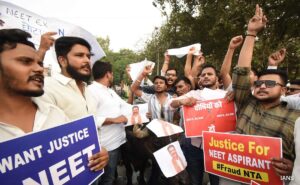ButSpeak.com
News which Matters.

Supreme Court rejects petitions to cancel NEET-UG 2024, citing lack of evidence for systemic leaks. The decision impacts 23 lakh students and maintains the exam’s integrity.
The Supreme Court on Tuesday dismissed petitions seeking the cancellation of the NEET-UG 2024 medical entrance exam, citing insufficient evidence to suggest a widespread leak of the question paper. The decision, delivered by a bench headed by Chief Justice of India (CJI) D.Y. Chandrachud, emphasizes the importance of maintaining the integrity of the exam and the potential adverse effects on the lives of nearly 23 lakh students.
During the proceedings, an expert panel from the Indian Institute of Technology (IIT) Delhi informed the court that the fourth option of a disputed physics question in the exam is the correct answer. This clarification is expected to impact the total marks of over four lakh candidates, including 44 students who achieved perfect scores.
The National Testing Agency (NTA), responsible for conducting the NEET-UG exam, faced intense scrutiny from the Supreme Court regarding the distribution of incorrect question papers at eight centers, including Jhajjar. The NTA had awarded grace marks to affected students, which raised concerns about the fairness of the process. However, the petitioners were unable to provide contemporary evidence to prove that the leaks were widespread rather than localized.
The court acknowledged the admitted fact that paper leaks occurred in Patna and Hazaribagh, Bihar, with both cases currently under investigation by the Central Bureau of Investigation (CBI). Despite these incidents, the Centre and the NTA argued that canceling the exam would be “counterproductive” and “seriously jeopardize” the future of numerous honest candidates without proof of a large-scale breach.
The Supreme Court’s decision underscores the challenges of balancing the need to uphold the sanctity of competitive exams while ensuring fairness for all candidates. The NTA has maintained that centre-wise data reveals no significant increase in success rates this year, countering allegations of malpractice.
Chief Justice Chandrachud emphasized that a re-examination would not only disrupt the lives of nearly 23 lakh students but also hinder the availability of qualified medical professionals in the future. This perspective highlights the broader implications of such decisions on the healthcare sector and the importance of timely and credible examinations.
The court’s ruling and the NTA’s defense reflect a commitment to preserving the integrity of national entrance exams. As investigations continue into localized incidents of malpractice, the focus remains on ensuring that future exams are conducted with enhanced security measures to prevent any breaches.